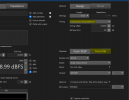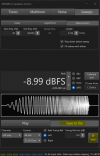The measurements were done in-room. I've measured several times with the same result, and the distortion at 48 kHz was audible as well (weird overtones). I measured at 75dB SPL, 30 cm from the tweeter.
Equipment used:
Receiver: Marantz SR-7013
Power amp: Audiophonics MPA-M400ET (Purifi)
Speaker: Revel C426Be
Mic: MiniDSP UMIK-2
REW V5.30.5 on a Macbook M1 Pro
The amplifier was connected to left front preout (in order to use the left channel in REW).
The only difference between the two measurements were the sample rates used for the sweeps, 48 kHz and 96 kHz. The files were played back from a USB stick (front USB-port on SR-7013), in stereo mode (I tried pure direct as well but it made no difference).
48 kHz. 3.83% THD at 6.5 kHz.

96kHz. 0.078% THD at 6.5 kHz.

The amplifier used is the mono version of HPA-S400ET, reviewed by Amir:

 www.audiosciencereview.com
www.audiosciencereview.com
Equipment used:
Receiver: Marantz SR-7013
Power amp: Audiophonics MPA-M400ET (Purifi)
Speaker: Revel C426Be
Mic: MiniDSP UMIK-2
REW V5.30.5 on a Macbook M1 Pro
The amplifier was connected to left front preout (in order to use the left channel in REW).
The only difference between the two measurements were the sample rates used for the sweeps, 48 kHz and 96 kHz. The files were played back from a USB stick (front USB-port on SR-7013), in stereo mode (I tried pure direct as well but it made no difference).
48 kHz. 3.83% THD at 6.5 kHz.
96kHz. 0.078% THD at 6.5 kHz.
The amplifier used is the mono version of HPA-S400ET, reviewed by Amir:

Audiophonics HPA-S400ET Review (Stereo Amplifier)
This is a review and detailed measurements of the Audiophonics HPA-S400ET. It was sent to me by the company after member request and costs 1 490,00 € (US $1,638). I must say this is one of the best packaging of class D amplifiers (Purifi in this case) that I have seen! It is slick and has...
 www.audiosciencereview.com
www.audiosciencereview.com


